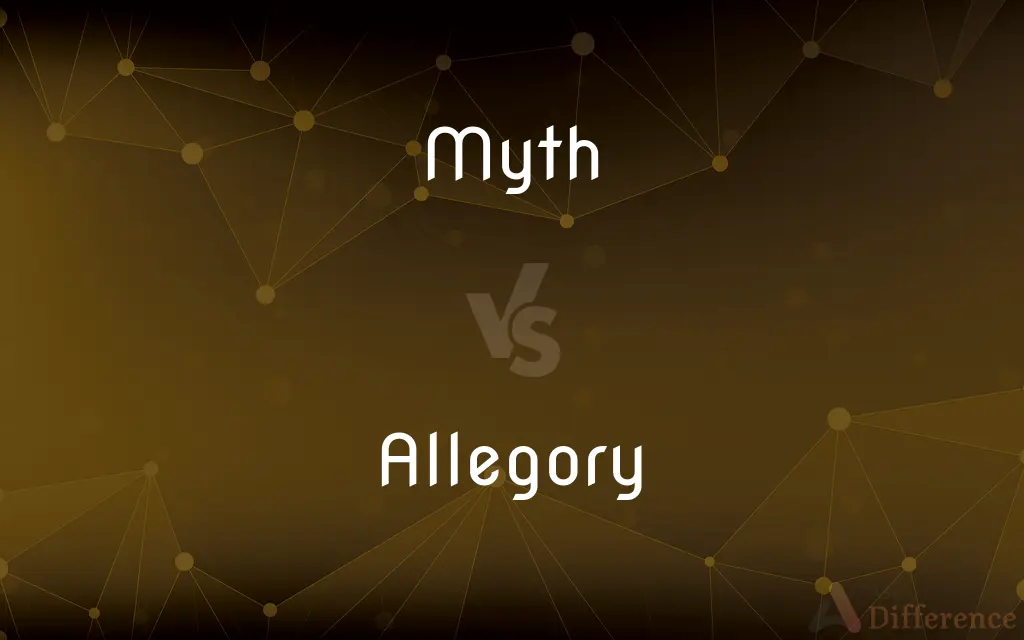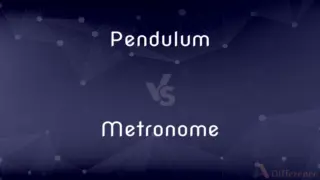Myth vs. Allegory — What's the Difference?

Difference Between Myth and Allegory
ADVERTISEMENT
Compare with Definitions
Myth
Myth is a folklore genre consisting of narratives that play a fundamental role in a society, such as foundational tales or origin myths. The main characters in myths are usually non-humans, such as gods, demigods, and other supernatural figures.
Allegory
As a literary device, an allegory is a narrative in which a character, place, or event is used to deliver a broader message about real-world issues and occurrences. Authors have used allegory throughout history in all forms of art to illustrate or convey complex ideas and concepts in ways that are comprehensible or striking to its viewers, readers, or listeners.
Myth
A traditional, typically ancient story dealing with supernatural beings, ancestors, or heroes that serves as a fundamental type in the worldview of a people, as by explaining aspects of the natural world or delineating the psychology, customs, or ideals of society
The myth of Eros and Psyche.
A creation myth.
Allegory
A story, poem, or picture that can be interpreted to reveal a hidden meaning, typically a moral or political one
Pilgrim's Progress is an allegory of the spiritual journey
Myth
Such stories considered as a group
The realm of myth.
ADVERTISEMENT
Allegory
The representation of abstract ideas or principles by characters, figures, or events in narrative, dramatic, or pictorial form.
Myth
A popular belief or story that has become associated with a person, institution, or occurrence, especially one considered to illustrate a cultural ideal
A star whose fame turned her into a myth.
The pioneer myth of suburbia.
Allegory
A story, picture, or play employing such representation. John Bunyan's Pilgrim's Progress and Herman Melville's Moby-Dick are allegories.
Myth
A fiction or half-truth, especially one that forms part of an ideology.
Allegory
A symbolic representation
The blindfolded figure with scales is an allegory of justice.
Myth
A fictitious story, person, or thing
"German artillery superiority on the Western Front was a myth" (Leon Wolff).
Allegory
(rhetoric) A narrative in which a character, place, or event is used to deliver a broader message about real-world issues and occurrences.
Myth
A traditional story which embodies a belief regarding some fact or phenomenon of experience, and in which often the forces of nature and of the soul are personified; a sacred narrative regarding a god, a hero, the origin of the world or of a people, etc.
Allegory
A picture, book, or other form of communication using such representation.
Myth
(uncountable) Such stories as a genre.
Myth was the product of man's emotion and imagination, acted upon by his surroundings. (E. Clodd, Myths & Dreams (1885), 7, cited after OED)
Allegory
A symbolic representation which can be interpreted to reveal a hidden meaning, usually a moral or political one.
Myth
A commonly-held but false belief, a common misconception; a fictitious or imaginary person or thing; a popular conception about a real person or event which exaggerates or idealizes reality.
Scientists debunk the myth that gum stays in the human stomach for seven years.
Allegory
A category that retains some of the structure of the category of binary relations between sets, representing a high-level generalisation of that category.
Myth
A person or thing held in excessive or quasi-religious awe or admiration based on popular legend
Father Flanagan was legendary, his institution an American myth. (Tucson (Arizona) Citizen, 20 September 1979, 5A/3, cited after OED)
Allegory
A figurative sentence or discourse, in which the principal subject is described by another subject resembling it in its properties and circumstances. The real subject is thus kept out of view, and we are left to collect the intentions of the writer or speaker by the resemblance of the secondary to the primary subject.
Myth
A person or thing existing only in imagination, or whose actual existence is not verifiable.
Allegory
Anything which represents by suggestive resemblance; an emblem.
Myth
An invented story, theory, or concept.
Allegory
A figure representation which has a meaning beyond notion directly conveyed by the object painted or sculptured.
Myth
A story of great but unknown age which originally embodied a belief regarding some fact or phenomenon of experience, and in which often the forces of nature and of the soul are personified; an ancient legend of a god, a hero, the origin of a race, etc.; a wonder story of prehistoric origin; a popular fable which is, or has been, received as historical.
Allegory
A short moral story (often with animal characters)
Myth
A person or thing existing only in imagination, or whose actual existence is not verifiable.
As for Mrs. Primmins's bones, they had been myths these twenty years.
Allegory
A visible symbol representing an abstract idea
Myth
A traditional story accepted as history; serves to explain the world view of a people
Allegory
An expressive style that uses fictional characters and events to describe some subject by suggestive resemblances; an extended metaphor
Share Your Discovery

Previous Comparison
Baloney vs. Ham
Next Comparison
Pendulum vs. Metronome













































